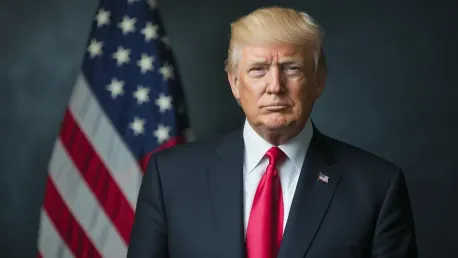The prospect of dismantling the U.S. Department of Education under the Trump administration brings significant implications for the educational landscape. The department has long played a crucial role in managing financial aid, enforcing civil rights laws, and tracking educational disparities. However, President Donald Trump’s vision for future education regulation suggests a profound shift from these established functions. Understanding both the magnitude and agency this department possesses is essential in evaluating the potential outcomes if the Trump administration’s plans are fully implemented.
Financial and Regulatory Responsibilities
The Department of Education serves vital functions, particularly in financial management and regulatory oversight designed to improve educational standards across the country. Each year, it distributes billions in federal funding to schools and colleges, also managing a federal student loan portfolio worth approximately $1.5 trillion for more than 40 million borrowers. The FAFSA and Pell Grant programs constitute significant sources of financial aid for students from lower-income backgrounds, demonstrating the department’s extensive involvement in educational opportunities.
Beyond financial aid, the Department of Education is critical in enforcing civil rights in educational institutions. This includes initiating investigations and issuing guidance on the application of civil rights laws for LGBTQ+ students and students of color. Its responsibilities extend to comprehensive data collection projects aimed at identifying and addressing disparities in educational resources, course access, and disciplinary actions among diverse racial and socioeconomic groups. Additionally, the department plays an indispensable role in accrediting colleges by vetting federally recognized accrediting agencies. These agencies ensure institutions meet required standards and provide quality education, safeguarding students and maintaining the integrity of higher education.
Trump’s Overhaul and Policy Changes
Under President Trump’s administration, significant steps have already been taken to overhaul much of the Department of Education’s work. Initiatives led by the Department of Government Efficiency aim to reduce perceived bureaucratic waste by canceling what are considered unnecessary contracts and scaling back operations at entities like the Institute of Education Sciences. These actions reflect Trump’s broader agenda of curbing federal bureaucracy and streamlining government functions.
Trump’s vision for the Department of Education starkly contrasts with that of his predecessor, Joe Biden. One prominent point of contention is student loan forgiveness. Trump has taken a firm stance against Biden’s initiatives to cancel student debt, labeling these efforts as unfair and potentially misleading to borrowers. During Biden’s presidency, over $175 billion in student debt had been forgiven for 4.8 million borrowers before the Supreme Court intervened. Trump’s administration decried these measures as unlawful, calling into question the federal government’s role in managing student debt and financial aid.
Civil Rights and College Accreditation
The reshuffling of priorities within the Department of Education under Trump’s leadership extends to significant changes in civil rights and college accreditation policies. One of the administration’s proposals involves having the Office for Civil Rights prioritize complaints related to antisemitism above other issues. The administration has also shown intent to scrutinize policies that allow transgender athletes to compete on women’s teams, reflecting a broader agenda that scrutinizes affirmative diversity and equity policies.
Trump’s administration views many affirmative action and diversity policies in education as forms of illegal discrimination. Proposals include imposing fines on colleges that employ these practices, emphasizing the administration’s stance against measures that it perceives as advancing a progressive agenda. On the accreditation front, Trump aims to replace existing agencies regarded as politically biased with new ones that align with traditional American values. By focusing on what the administration terms “radical left accreditors,” these actions aim to mitigate what they see as undue political influence in the accreditation process, affecting institutional standards and practices.
K-12 Education Funding and State Governance
In the realm of K-12 education, the Trump administration advocates for a significant reallocation of program oversight from federal levels to state governments. Programs like Title I, which supports schools with high numbers of low-income students, and the Individuals with Disabilities Education Act receive notable federal funding to provide essential services. These resources target areas such as classroom supplies, specialized services for students, and positions like social workers crucial for student well-being and education quality.
Trump’s administration argues that education management should be decentralized, allowing states greater autonomy over fundamental aspects of their educational systems. This policy direction seeks to diminish federal oversight and place more control in the hands of local authorities, which aligns with the administration’s broader philosophy. By delegating these responsibilities to the states, the aim is to tailor educational programs to better address local needs and contexts, potentially fostering an educational environment that corresponds more closely with the values and requirements of individual communities.
Heritage Foundation’s Recommendations
The possibility of dismantling the U.S. Department of Education under the Trump administration has significant implications for the education system. The department has traditionally been responsible for managing financial aid, enforcing civil rights laws, and monitoring educational disparities. President Donald Trump’s vision for the future of education regulation represents a major shift from these established functions. His administration proposes decentralizing control, pushing more power to individual states and localities. This approach could lead to varied educational standards and policies across the country, potentially creating disparities in the quality of education received by students in different states. Additionally, the reduction of federal oversight could impact the enforcement of civil rights in schools, which has been a critical role of the Department of Education. It’s crucial to consider the scope and authority of this department when evaluating the potential consequences if the Trump administration’s plans are fully realized, as these changes could substantially alter the landscape of American education.









